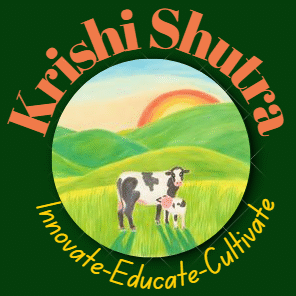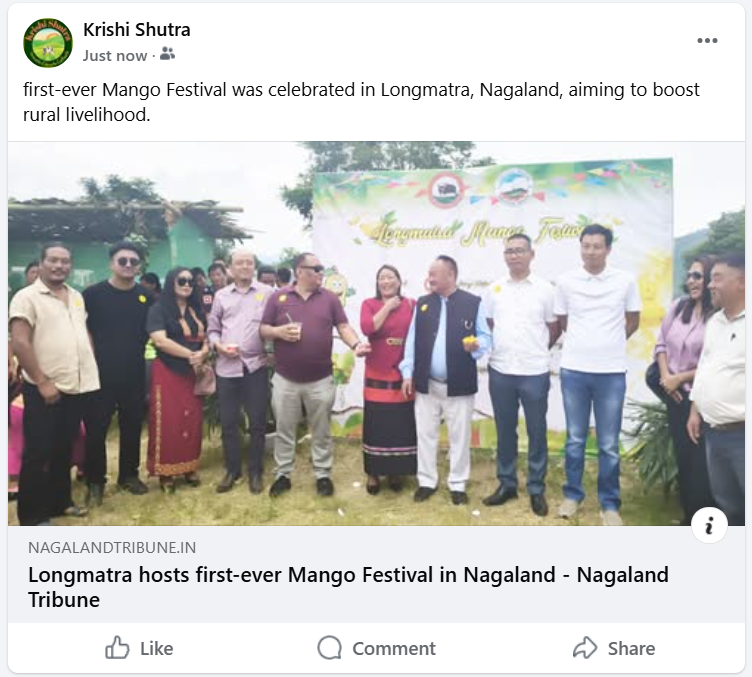“Nagaland Hosts 1st-Ever Mango Festival to Promote Local Farming and Agri-Entrepreneurship”- Nagaland agriculture news
Nagaland agriculture news | First mango festival in Nagaland
Nagaland celebrated a landmark event this month — its first-ever Mango Festival, a vibrant initiative aimed at showcasing the state’s mango growers and promoting agri-entrepreneurship among tribal farmers. Held in [insert town/city, e.g., Dimapur or Kohima if known], the festival attracted farmers, government officials, agri-startups, and food entrepreneurs from across the Northeast. Mango cultivation in Northeast India makes an remarkable entry with potential exports to ASEAN country.
Organized by the State Department of Horticulture, in collaboration with local farmers’ groups and self-help organizations, the event sought to promote indigenous mango varieties, improve marketing linkages, and encourage youth involvement in value-added agri-businesses.
Unlike larger mango festivals in states like Uttar Pradesh or Andhra Pradesh, Nagaland’s version focused on community-led production, natural farming, and tribal-grown mangoes with unique taste profiles. Visitors had a chance to witness the Mango cultivation in Northeast India:
Sample organic mango varieties grown in hill districts
Interact with mango growers and agri-tech startups
Learn about processing and packaging for small businesses
Explore opportunities in mango-based products like pickles, jams, and dried fruit
Mango Cultivation in Nagaland
| District | Features |
|---|---|
| Dimapur | Leading mango-producing district due to flat plains and warmer climate |
| Mokokchung | Suitable for mixed horticulture including mangoes in lower elevations |
| Wokha | Known for fertile valleys and FPO-based fruit farming initiatives |
| Peren | Increasing mango cultivation along with pineapple and banana |
| Mon | Some pockets suitable for mango under organic tribal farming practices |
| Zunheboto | Emerging district with government focus on expanding fruit orchards |
Mango cultivation in Northeast India
“This is the first time our mangoes have received this level of attention. It motivates us to expand and brand our farms,”
says Lentina Jamir, a second-generation mango farmer from Mokokchung.
“We’ve sold more here in one day than we usually do in a whole week at local markets,”
adds another grower, highlighting the impact of such exposure.
Event has been widely covered in local and national media. Northeast Today writes “Nagaland: First-Ever Mango Festival Celebrated In Longmatra, Kiphire” similarly
#Nagaland | The inaugural Mango Festival was held today at Longmatra in Nagaland’s Kiphire district, drawing farmers, entrepreneurs and local officials to celebrate and promote the region’s mango cultivation.
— NORTHEAST TODAY (@NortheastToday) July 19, 2025
Read more..https://t.co/O4bksGExsN#MangoFestival #Farmers… pic.twitter.com/XLc3nq0EN9
— Krishi Sutra (@KrishiSutra) July 20, 2025
You may watch the glimpses of the event. Indian Council of Agricultural Research has its center ICAR-Research Complex for NEH Region, Nagaland Centre has been emphasizing on the Mango cultivation in Northeast India as well as horticulture based agriculture for boosting farmers income and improving rural livelihood. Recently ICAR celebrated its 97th Foundation day and boasted for the horticulture products led growth in the agriculture sector. Event of these kinds boosts the moral of local farmers and producers and scintillates the rays of hope for cooperative economic development in the region.
Based on the overwhelming success, the state is now considering making the Mango Festival an annual event, possibly rotating across districts. There’s also a push to develop:
- Cold storage and transport systems for fruit logistics
- Training centers for mango processing
- Tie-ups with retailers and exporters to push Nagaland’s mangoes into national markets
This Mango Festival is more than just a celebration of fruit — it’s a bold step toward agricultural self-reliance, farmer empowerment, and local brand building in Nagaland. KrishiShutra congratulates all stakeholders and encourages similar festivals in other regions to spotlight local crops and boost grassroots agri-entrepreneurship.
Lot of events were organized in the festival. One such events got attention of national as well as the local media is the Mango eating competition. Details you may watch in the video.
Interestingly most of the mango varieties grown in Nagaland are same which are widely grown in other parts of the country. below table gives you an idea of mango varieties.
| Variety Name | Type | Key Features & Notes |
|---|---|---|
| Dashehari | Table & juice | Popular North Indian variety; thrives well in Dimapur and Wokha; early-season fruit |
| Langra | Table mango | Known for its aromatic pulp and medium size; cultivated in Mokokchung & Peren |
| Himsagar | Dessert variety | A West Bengal-origin variety; sweet, fiberless pulp; tested successfully in Mon |
| Amrapali | Hybrid (Dashehari × Neelum) | Dwarf variety; suitable for high-density orchards in small landholdings |
| Neelum | Multi-climate | Late-season variety with extended shelf life; fits mixed orchards |
| Banganapalli | Premium table | Yellow-fleshed, large-sized mango; now gaining popularity in commercial orchards |
| Totapuri | Processing grade | Grown mainly for pulp and pickles; tolerant to rainfall and moisture variations |
| Mallika | Hybrid (Neelum × Dashehari) | Fiberless, sweet, disease-resistant; promoted by horticulture dept in pilot farms |
Amrapali and Mallika are being promoted under high-density planting programs by the Department of Horticulture.
Farmers in Dimapur, Wokha, and Mokokchung have received support to grow Totapuri and Banganapalli under cluster-based fruit farming models.
Organic mango farming is practiced in tribal pockets, especially in Zunheboto and Peren, often without synthetic inputs.
Nagaland’s mangoes are known for their natural sweetness, unique aroma, and chemical-free production, making them ideal for direct sales and niche markets.
Thus, The first-ever Mango Festival in Nagaland marks a significant milestone in the state’s journey toward agricultural self-reliance and farmer-led innovation. By bringing together local mango growers, agri-entrepreneurs, government bodies, and consumers on a single platform, the festival not only celebrated the fruit but also spotlighted the potential of Nagaland’s horticulture sector. With its focus on indigenous varieties, sustainable farming, and rural entrepreneurship, the event has sown the seeds for a stronger, more inclusive agri-economy. If nurtured with consistent support, such festivals can transform the narrative of farming in the Northeast — from subsistence to success.


